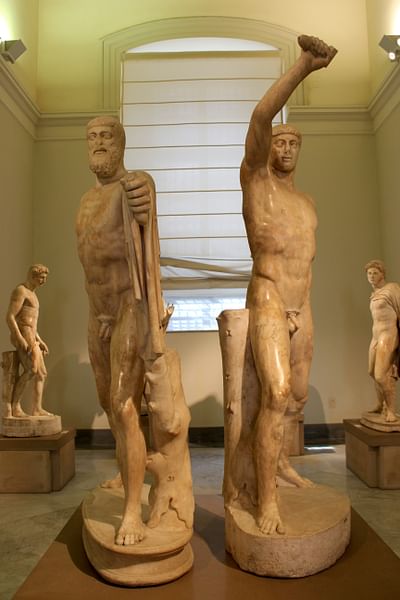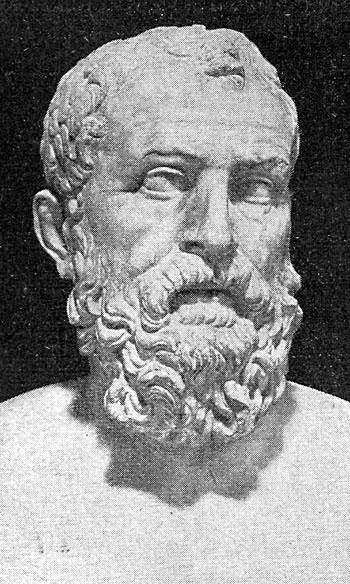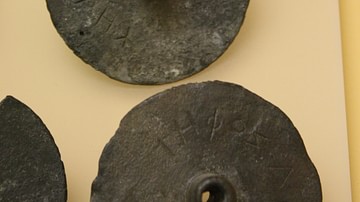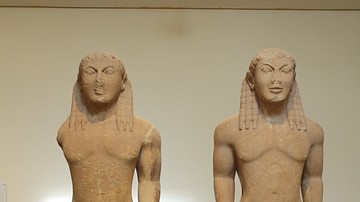Tyrannies existed across the Greek world from the city-states to the islands of Sicily and Samos. Most historians date the Great Age of Greek Tyranny from 750 to 500 BCE, ending with the ousting of Hippias; however, some authors extend the period into the 4th century BCE, embracing the despotic rule of Cassander in Macedonia as well as the tyrannies of Dionysius I and II in Syracuse.
The Nature of Tyranny
The word 'tyrant' carries with it a negative connotation. A tyrant is a ruler whose absolute power exists outside of the law; therefore, a tyrant is never required to give an explanation of his actions, good or bad, to his citizenry. The 17th-century English philosopher John Locke wrote in his essay on civil government: "Tyranny is the exercise of power beyond right. ... Wherever law ends, tyranny begins." (71)
However, early Greek tyrants were not deemed as brutal as others but, instead, were considered both wise and moderate. The first Greek tyrants, while coming from the elite class, came to power because of a desire to avoid the domination of oligarchies. The oppressive government of a tyrant could bring benefits to his people, even promoting social stability. Some tyrants, such as Cypselus and Periander of Corinth, were empire-builders, overseeing the construction of temples and harbors, thereby maintaining both power and popularity by working with the interests of the people in mind.
Regardless of their accomplishments as tyrants – good or bad – many usurped power by force or threat of force. The Athenian Cleisthenes and Corinthian Cypselus are two examples who achieved power through a coup. Over time, tyrannies would eventually fail and give way to a less oppressive government. Individuals within a tyrannical government would rise up in protest against a despotic ruler and oust him, replacing him with more democratic leadership.
Tyrants of Corinth
The 7th and 6th centuries BCE witnessed a number of tyrants in both Corinth and Athens. Among those who rose to prominence in Corinth were Cypselus (c. 657-627 BCE) and his son Periander (627-587 BCE). Drawing support from the wealthy elite of Corinth, Cypselus came to power upon the overthrow of the aristocratic Bacchiadae, the family of his mother. He established one of the greatest and long-lasting tyrannies in Greece.
However, Cypselus almost never lived to become a tyrant. After his birth, according to Herodotus, a Delphi Oracle predicted that Corinth was ill-fated if the child (Cypselus) was allowed to grow into adulthood. The Oracle foretold that he would become a tyrant. It was thought best by the ruling Bacchiads that the young infant should be put to death; unfortunately for Corinth but fortunately for Cypselus, his mother saved him by hiding him in a chest. The predictions proved correct. Herodotus wrote that the adult Cypselus banished many Corinthians, "deprived many others of their possessions, but the greatest number by far were deprived of their lives" (408). Unlike his son and regardless of his cruelty, he did not see the need for a bodyguard. Like many other tyrants, he accomplished some positives for Corinth: he built a treasury a Delphi and with a strong fleet founded colonies in northwestern Greece. Lastly, he is also credited with devising the Corinthian tribal system.
Succeeding his father in 627 BCE, Periander was viewed by many as a typical oppressive tyrant. Herodotus wrote that he was "certainly a more gentle ruler than his father but after communicating with Thrasybulus, tyrant of Miletus, he became far more bloodthirsty than Kypselos (Cypselus) had ever been" (408). The tyrant of Miletus encouraged the young Periander to murder the prominent men of Corinth. "It was then that he exhibited every kind of evil to the citizens. ... Periander completed all that Kypselos had left undone in his killing and banishing of Corinthians." (Herodotus, 409) He even murdered his own wife.
Although he endorsed an extensive building program such as building an artificial harbor, he attacked both luxury and slave ownership. He established his son Lycophron as a tyrant at Corcyra, founded Potidaea as a colony in the Aegean Sea, and displayed his warlike reputation by attacking the small polis of Epidaurus and capturing the tyrant Procles, his father-in-law. Upon his death in 587 BCE, he named Lycophron to succeed him; however, he was murdered before he could leave Corcyra for Corinth. Periander was succeeded by his nephew Psammetichus, the last of the Cypselid tyrants. The end of the dynasty was predicted by a Delphi Oracle given to Periander's father: "He [Cypselus] and his sons will prosper, but the son of his sons, no longer." (Herodotus, 408)
Tyrants of Athens
The constitution introduced by the Athenian tyrant Draco (c. 621 BCE) was the first time Athenian law was put into writing. Draco enacted a series of callous laws where even minor offenses such as stealing fruit and vegetables carried severe penalties. While these smaller offenses often deserved death, there was no more severe penalty for greater offenses such as temple robbing or homicide. His laws were deemed to be so strict that he was once accused of writing them in blood. The term 'draconian' comes from Draco and his harsh laws. Solon would later repeal many of the Draconian laws, except those dealing directly with homicide.
The Athenian Solon (c. 640 to c. 560 BCE) was considered both a politician and poet, even refusing to accept absolute power. To Herodotus, he was a sage as well as a lawgiver. Because of the countless advantages seen in many of his reforms, he was given power to revise the constitution and unsound legislation. Among his initial reforms was to reorganize the Athenians into four distinct classes:
- pentakosiomedimnoi
- hippeis
- zeugitai
- thetes
These classes were the basis for all political rights. He created a new code of law, superseding those of his predecessor, Draco. He initiated a new category of lawsuits where any citizen could now prosecute in court. Plutarch (45/50 to c. 120/125 CE) wrote that he fashioned his laws so he could prove to his fellow Athenians that honesty was always better than criminality. He was viewed by the rich as acceptable because of his own wealth and by the poor for his integrity. Plutarch quoted him as saying, "While tyranny may be a delightful spot, there is no way back from it" (58). This attitude, according to Plutarch, earned him a great deal of scorn. However, the historian added>
…his rejection of tyranny did not mean that his handling of affairs was particularly gentle, or that he meekly deferred to influential people or enacted the kind of legislation he thought would please those who had elected him. (Plutarch, 58)
He took a ten-year leave of absence from Athens to travel and hoped the Athenian people would abide by his laws. Unfortunately, three factions soon formed: one under Lycurgus (the Athenian, not the Spartan), one under Megacles, and another under Pisistratus (aka Peisistratus). Pisistratus (c. 600-527 BCE) prevailed and assumed power; he immediately sought Solon as an advisor. During his 56-year reign, he was viewed as benevolent and law-abiding.
Pisistratus had two sons: Hipparchus and Hippias. Hipparchus was assassinated by Harmodius and Aristogeiton in 514 BCE. Herodotus wrote that prior to his assassination, the young Hipparchus had a dream about his own death but, after consulting with interpreters, dismissed it; unfortunately for him, the dream came true. After his brother's death, Hippias, who had been considered a very mild ruler before, became embittered against the Athenians and started to rule as a tyrant. Hippias was ousted by Cleomenes I of Sparta in 510 BCE. He and his family escaped to Sigeum, later joining Darius I (r. 522-486 BCE) at the Battle of Marathon.

In a power struggle, Cleisthenes (570 to c. 508 BCE), who had served as archon under Hippias, assumed power in Athens and put into place a platform of reforms. His first major change was a reorganization of the citizen body in an attempt to undermine the old channels of influence. By 500 BCE, the system allowed many adult male citizens a possible chance to participate in the government of the city. While considered by some as the founder of Athenian democracy, others harken back to Solon or even Theseus. Although Cleisthenes initiated a number of far-reaching reforms, it would be another half-century before the Athenian constitution would become fully democratic. The historian Herodotus in his Histories wrote, "Although Athens had been a great city before, it became even greater once rid of its tyrants." (395)
Conclusion
According to some sources, tyranny was often a regrettable but necessary road towards democracy. However, in his book The Republic Plato (l. 428/427 to 348/347 BCE) claimed that the nature of tyranny arises from democracy, positing that "an excessive desire for liberty at the expense of everything else is what undermines democracy and leads to the demand for tyranny" (299). Aristotle (384-322 BCE) held that the best forms of government were a monarchy, an aristocracy, and a constitutional republic, but when corrupted they degenerate into tyranny, oligarchy and democracy.










